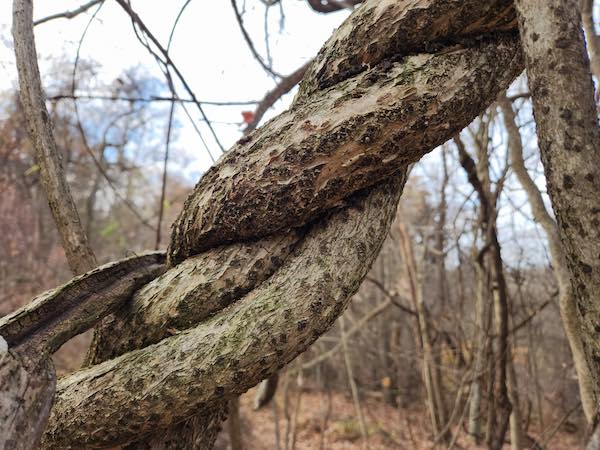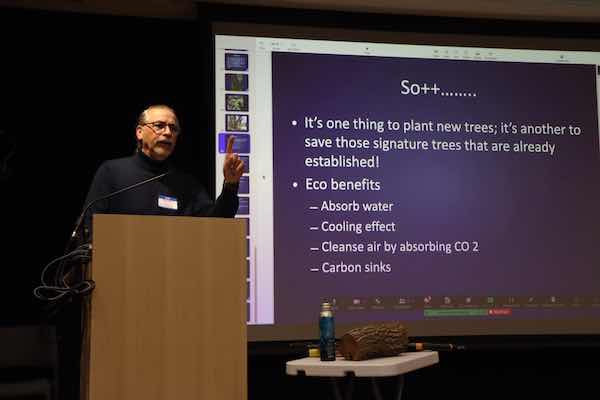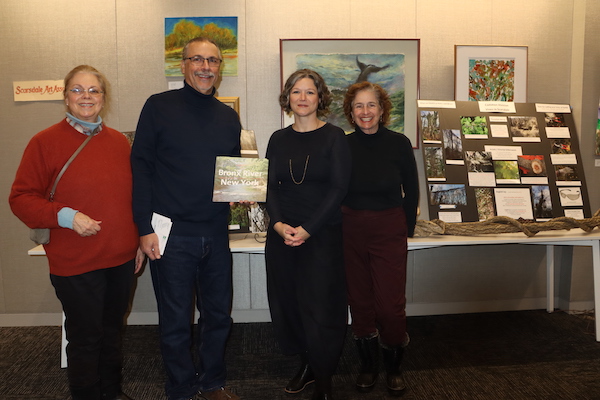Removing Invasive Vines and Planting for Pollinators
- Tuesday, 09 January 2024 12:35
- Last Updated: Tuesday, 09 January 2024 13:24
- Published: Tuesday, 09 January 2024 12:35
- Elaine Weir
- Hits: 1619

(This article was submitted by the Scarsdale Forum's Sustainability Comittee and Friends of the Scarsdale Parks)
On a wintry afternoon on Sunday, January 7th, Scarsdale Forum’s Sustainability Committee and Friends of the Scarsdale Parks co-sponsored a presentation on protecting our trees and shrubs from invasive vines and planting pollinator gardens. The program attracted over fifty-five people who participated in person and on Zoom.
Bob DelTorto, president of the Bronx River Parkway Reservation Conservancy, addressed the importance of removing invasive vines. By training hundreds of volunteers to cut vines he has saved thousands of trees. He focused on three problematic vines invading Westchester County.

Porcelain berry may grow over 40 feet in thick mats, killing trees and shrubs by blocking sunlight. Bob calls Oriental bittersweet the “boa constrictor” of vines, smothering a tree to death by girdling and blocking light. English ivy, the ubiquitous but highly destructive plant, not only kills mature trees by girdling its truck and limbs, but provides a reservoir for bacterial leaf scorch which causes premature browning, leaf drop, and eventual death of the tree.
Bob emphasized that preserving our established canopy of mature trees helps us and our environment, while newly planted trees take decades of growth before providing similar benefits. Trees combat climate change by absorbing CO2; cleaning the air of polluting gases and particulates; providing atmospheric oxygen; creating shade that cools street heat islands; and conserving energy by reducing air conditioning demands. Trees cool the air by releasing water vapor from their leaves, and help prevent soil erosion, flooding, and water pollution by slowing rainwater runoff. Tree roots act like a sponge that filters water naturally and recharges groundwater. Trees provide habitat for a variety of species.
After the presentation numerous participants volunteered to cut vines in Scarsdale.
Margie Lavender, active in Hasting’s Pollinator Pathway, recommended native plants that support wildlife and create climate resilience. Such nature-based gardening creates a vibrant ecosystem safe for families and pets. Our lawns, modeled after 18th century formal gardens, are pollinator deserts. Margie recommended:
• Not using pesticides or herbicides unless applied carefully, without spraying, and only for severe problems.
• Replacing lawn with native shrubs, trees, and perennials.
• Cutting grass lawns high, four to six inches, to allow for blooms like clover, crocus, and violets.
• Providing a water source for birds and other pollinators.
• Leaving autumn leaves in borders and mulch mowing remaining leaves to enrich soil and lawns.
• Planting a succession of blooms in large drifts to enhance visibility to pollinators from the air.
• Planting native oaks, the single most ecologically important tree that supports over 500 species.
Trees and pollinators need our help. Scarsdale has lost thousands of trees. There are 3 billion fewer birds in North America today than in 1970 and 40% fewer insects including butterflies, bumblebees, and fireflies. Pollinators are responsible for supporting 80–95% of plant species. Because the majority of local green space is privately owned, this ecological battle to protect and conserve our tree canopy and ensure the survival of pollinators needs to be fought in our own backyards.

Scarsdale Forum Inc. Sustainability Committee
Friends of the Scarsdale Parks, Inc.
Scarsdale Forum Inc.
Contact elaine.weir.sherman@gmail for more information about its vine cutting project
Friends of the Scarsdale Parks, Inc.
Contact meppenstein@eppenstein.com for more information about its vine cutting and pollinator garden projects













